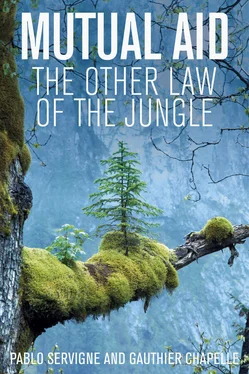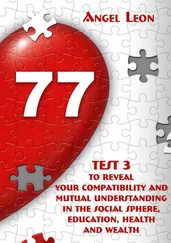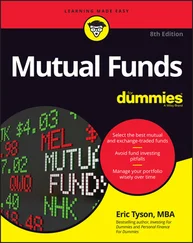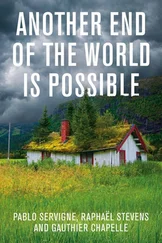If you observe living (‘other than human’) beings from the point of view of competition, the picture jumps out at you: the lion eats the antelope, chimpanzees kill each other, young trees elbow each other aside to gain access to light, and fungi and microbes show no pity to each other. The myth unfolds in the light of this ruthless universe. The state of nature is synonymous with chaos, strife, looting and violence. It’s the law of the jungle, the ‘survival of the fittest’, or the ‘war of all against all’, in the words of one of the fathers of liberalism, the philosopher Thomas Hobbes.
Myths give colour to the world. And an idea, when repeated countless times, ends up being true. Just look around: if you say that human beings are naturally altruistic, you’ll probably be viewed as naïve or idealistic. If you say they’re naturally selfish, you’ll have the ‘realists’ on your side.
Since the last century, Western culture, modern and utilitarian, has effectively developed a hypertrophied competitiveness , abandoning its generous, altruistic and benevolent aspects, which are now quite atrophied. Mutual aid? Who still believes in that ? Sometimes it miraculously reappears, thanks to an unusual item on the evening news or in an animal video on the Internet that gets watched millions of times. Fascinating!
Let’s be honest: surely everyone has felt the deep joy of helping a loved one or of being given a hand by someone else? And what happens when a region is hit by a flood? Is there more looting than acts of solidarity? Of course not! Neighbours pull together, other people rush in from all sides and take crazy risks to save those who need to be rescued. Strangers from hundreds or thousands of miles away get organized and send in money. More generally, aren’t social security, the redistribution of wealth, humanitarian aid, education and even cooperatives incredible institutions of mutual aid? Why has this fact become so impossible for us to see?
A close examination of the spectrum of living creatures – from bacteria to human societies, via plants and animals – reveals that mutual aid not only is ubiquitous, but has been present since time began. It’s simple: all living creatures are involved in relationships of mutual aid. All of them. Mutual aid isn’t a mere news item; it’s a principle of the living world. It’s even a mechanism of the evolution of living creatures: the organisms which survive difficult conditions most easily are not the strongest; they’re those which manage to cooperate.
In fact, in the jungle, there’s a whiff of mutual aid that we can no longer smell. This book will be an attempt to inhale that inspiration, in a long deep breath.
A potentially fatal paralysis
Aggression and competition do exist in the living world – there’s no denying it. For example, it’s competition that prevents pathogenic bacteria from invading the microbial ecosystem in our mouths. It also allows felines to maintain their territory, and some humans find it stimulates their zeal, even their team spirit. Sport as we play it is a ritualized way of channelling competition, and competition forces us to surpass ourselves, and in some cases to ‘give the best of ourselves’.
But competition also has serious drawbacks. It’s exhausting. Most animals and plants understand this well: they minimize it and avoid aggressive behaviour as much as possible, because they have too much to lose. It’s too risky, too tiring. For a well-equipped individual, one who is well trained and psychologically at his or her best, competition is a challenge which makes progress possible thanks to a powerful effort (in the shortest possible time). But for others, those who are not ready, those who are unwilling or unable to enter the arena, or those who’ve been there too long already, this effort is an endless source of stress.
Moreover, competition separates; it brings out differences. Competitors focus their attention on that ‘little bit extra’, the little something which sets them apart from their competitors and must be kept secret because it will allow them to win the race. Don’t we say, ‘that little bit extra made all the difference’? Competition doesn’t promote social bonds, but rather encourages cheating and distracts from the common good. Indeed, why spend time working in common if this might favour your competitors?
Basically, what is ‘winning’? Finding yourself on the highest podium … dramatically alone? Drawing the gaze of the others by tugging on their gloomy passions: envy, jealousy and resentment? Helping create a planet where 99% are ‘losers’?
By pushing the cult of competition to its extreme, and by institutionalizing it, our society has not only created a violent world, it has above all deprived life of much of its meaning. Unlimited competition is an invitation – even an obligation – to a never-ending race. The disintegration of the bonds between humans and the breaking of our bonds with living creatures has created a great void, an immense need for consolation, which we are trying to constantly fill by frantically accumulating objects, trophies, sexual conquests, drugs or food. Excess, which the Greeks called hubris, then becomes the only way of being in the world.
Competition, infinite expansion and disconnection from the living world have been three founding myths of our society for several centuries now. Their mechanism is demonstrably highly toxic: just as a perpetually expanding cell ends up destroying the organism of which it is a part, an organism that destroys the environment in which it lives, and poisons its neighbours, ends up dying alone in a desert.
Unfortunately, we are now past the stage of mere warnings. This is our reality. Our relationship to the world has caused irreversible shifts: certain natural systems that make up the biosphere have been seriously destabilized, to the point of gravely threatening the conditions of survival of many species on earth, including our own. And this is quite apart from the imminent end of the fossil fuel era, the depletion of mineral resources, widespread pollution, the extreme fragility of our economic and financial system, the growing inequalities between countries and the increasing number of refugees. We have here a situation which resembles a huge tottering game of dominoes, on the verge of a civilizational collapse. 1
The assessment of the possible forms that this chain of disasters might assume is called collapsology , 2a discipline which, as well as providing information, connects different environments and different sensibilities: environmentalists, survivalists, academics, soldiers, engineers, peasants, activists, artists, politicians, and so on. In our meetings with all those who are concerned about the present situation, we were struck by how recurrent and urgent the question of mutual aid was. There were frequent questions and reactions such as, ‘How can we keep all this from getting worse?’, ‘We’re heading straight for a Mad Max scenario’, ‘You’d have to bring out the best in human beings to avoid such a fate!’ and ‘We’re selfish beings – people are just going to kill each other!’
If the economic, political and social climate deteriorates rapidly, our imagination, saturated with the monoculture of competition, will always come up with the same old story: the war of all against all and pre-emptive aggressiveness. Through a self-fulfilling prophecy, ‘believers’ will prepare for violence in a climate of fear and create the perfect conditions for real tensions to arise. But another scenario, that of cooperation, could just as easily emerge – so long as we include it in the realm of possibilities!
Читать дальше












